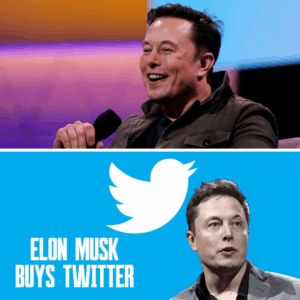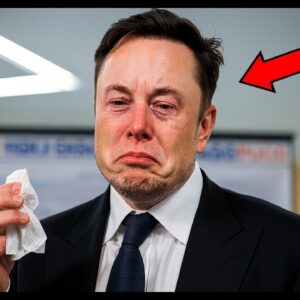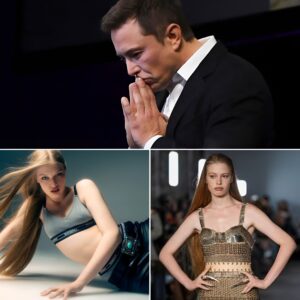In the summer of 2020, a single photograph sent the internet into a frenzy of laughter and creativity. The image captured Mark Zuckerberg, the tech titan behind Facebook (now Meta), surfing off the coast of Hawaii with his face slathered in an almost comical amount of white sunscreen. The result? A ghostly, pale visage that made him look less like a billionaire CEO and more like a character from a sci-fi flick or a circus act. This moment didn’t just go viral—it became a cultural phenomenon, spawning countless memes, witty comparisons, and even a sly nod from Zuckerberg himself when he later poked fun at the incident. But what made this image so captivating, and why does it continue to resonate? Let’s dive into the story behind the sunscreen saga, exploring its origins, the internet’s reaction, and how Zuckerberg turned an awkward moment into a masterclass in self-awareness.
The photo was taken on a sunny day in July 2020, as Zuckerberg enjoyed a surfing session in Hawaii alongside professional surfer Kai Lenny. Zuckerberg, known for his analytical demeanor and often reserved public persona, was spotted riding an electric eFoil surfboard, a high-tech gadget that retails for around $12,000. But it wasn’t the pricey board or his surfing skills that stole the spotlight. Instead, it was his face, coated in a thick layer of zinc oxide-based sunscreen that gave him an almost otherworldly appearance. The sunscreen, applied with such zeal that it seemed to obscure his features, reflected the sunlight in a way that made him look like he’d stepped out of a black-and-white film—or, as some would later joke, a distant planet.
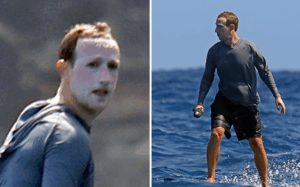
The internet, ever quick to seize on a quirky moment, wasted no time. Within hours of the photo surfacing, social media platforms, particularly Twitter (now X), were flooded with reactions. Users couldn’t resist poking fun at Zuckerberg’s look, with many comparing him to pale-faced pop culture icons. Some saw a resemblance to the Joker, the iconic Batman villain known for his chalk-white makeup. Others likened him to Data, the android from Star Trek: The Next Generation, whose artificial pallor mirrored Zuckerberg’s sunscreen-heavy glow. A particularly popular comparison was to mimes, with users joking that Zuckerberg was practicing to become a “mime surfer” trapped in an invisible box. More outlandish takes suggested he looked like No-Face from Spirited Away, Mrs. Doubtfire with her face caked in frosting, or even a lizard shedding its skin. The creativity was boundless, with photoshopped images adding snake tongues or ghostly effects to amplify the humor.
What fueled this meme frenzy? For one, Zuckerberg’s public image played a significant role. As the CEO of a company that has shaped modern communication, he’s a polarizing figure. To some, he’s a visionary who connected the world; to others, he’s a symbol of tech overreach, privacy controversies, and corporate power. The sunscreen photo offered a rare glimpse of Zuckerberg in a vulnerable, human moment—one that didn’t involve congressional hearings or corporate announcements. Here was a billionaire, awkwardly navigating a leisure activity, looking anything but cool. The contrast between his carefully curated tech mogul persona and this unintentionally hilarious image was irresistible. It was a chance for the internet to “punch up,” poking fun at someone whose wealth and influence seem almost untouchable.
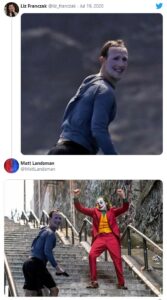
Beyond the humor, the photo touched on a universal theme: the lengths we go to protect ourselves. Sunscreen, especially zinc oxide-based varieties, is a practical choice for anyone with fair skin spending hours under the Hawaiian sun. For Zuckerberg, whose pale complexion is well-documented, the heavy application made sense from a health perspective. Physical sunscreens like zinc oxide sit on the skin’s surface, creating a barrier against harmful UV rays, unlike chemical sunscreens that absorb them. Given the long hours he likely spent on the water, his cautious approach was understandable, even if the execution was overzealous. Some surfers and dermatologists online defended his choice, noting that zinc oxide is a common go-to for water sports enthusiasts who prioritize skin protection over aesthetics. Yet, the sheer volume of sunscreen—enough to make his face glow like a beacon—turned a sensible decision into a comedic spectacle.
The memes weren’t just about the photo itself; they reflected broader cultural sentiments. In 2020, the world was grappling with a pandemic, social unrest, and political polarization. Zuckerberg’s company was under fire for its handling of misinformation and hate speech, with advertisers boycotting the platform as part of the #StopHateForProfit campaign. Against this backdrop, the sunscreen photo became a lighthearted distraction—a moment of levity in a heavy year. It also tapped into ongoing jokes about Zuckerberg’s demeanor, which some have described as robotic or alien-like. The image reinforced these narratives, with users quipping that the sunscreen was hiding his “true extraterrestrial form” or that he was malfunctioning in the water, his “wires” at risk of short-circuiting. These jokes, while playful, underscored a public fascination with Zuckerberg’s enigmatic persona.
Zuckerberg’s response to the viral moment was surprisingly deft. In April 2021, during an Instagram Live chat with Instagram head Adam Mosseri, he addressed the photo with a mix of humor and candor. He explained that he’d noticed a paparazzi photographer trailing him while he was eFoiling with Kai Lenny. In a spur-of-the-moment attempt to disguise himself, he slathered on extra sunscreen, hoping it would make him unrecognizable. The plan, he admitted, “backfired spectacularly.” Far from being defensive, Zuckerberg leaned into the joke, acknowledging that “no one needs to be wearing that much sunscreen” and laughing at how uncool he looked. This self-deprecating approach showed a side of Zuckerberg rarely seen—a willingness to embrace his own absurdity.
He took it a step further later that year when Meta, the rebranded parent company of Facebook, was announced. In a promotional video, Zuckerberg subtly referenced the sunscreen saga by placing a tube of sunscreen on his desk. The nod was unmistakable: he was in on the joke. This move was a masterstroke in public relations. By poking fun at himself, Zuckerberg diffused some of the mockery and humanized himself in the eyes of a skeptical public. It also demonstrated an awareness of internet culture, a space his company has helped shape. The sunscreen tube became a symbol of his ability to take a hit and keep moving forward, turning a moment of embarrassment into a clever callback.
The saga also highlighted Zuckerberg’s complex relationship with Hawaii. He owns multiple properties on the island of Kauai, including a 750-acre estate purchased for over $100 million in 2014. These land acquisitions have sparked controversy, with some locals accusing him of “colonizing” the island by buying up large swaths of land. A 2020 petition, which garnered over 800,000 signatures, called for him to stop acquiring property, alleging he was displacing native Hawaiians. Zuckerberg’s team has denied these claims, stating that he’s not suing locals or forcing anyone off their land. The surfing photo, taken against this backdrop, added fuel to the narrative of Zuckerberg as an out-of-touch outsider enjoying Hawaii’s beauty while locals grappled with economic and cultural challenges. The memes, in a way, became a form of protest, blending humor with critique.
From a broader perspective, the sunscreen incident underscores the power of viral moments in shaping public perception. In the age of social media, a single image can define a person’s narrative for years. For Zuckerberg, the photo joined a roster of meme-worthy moments, like his 2016 Facebook Live video where he raved about grilling meats. Yet, unlike those earlier instances, the sunscreen saga showed him adapting to the internet’s playbook. By embracing the humor, he reclaimed some control over the narrative, proving that even a billionaire can laugh at himself.
So, why does this moment still resonate? It’s more than just a funny photo. It’s a snapshot of a cultural crossroads—where tech, celebrity, and internet culture collide. It’s a reminder that even the most powerful among us can’t escape the internet’s magnifying glass. And it’s a testament to the enduring appeal of a good laugh, especially when it comes at the expense of someone who seems larger than life. Zuckerberg’s sunscreen-slathered face may have been a fleeting moment, but its legacy lives on in the memes, the laughs, and the tube of sunscreen that became an unlikely icon. Whether you see him as a clown, an alien, or just a guy trying to avoid a sunburn, one thing’s clear: this is one surf session the internet won’t soon forget.
